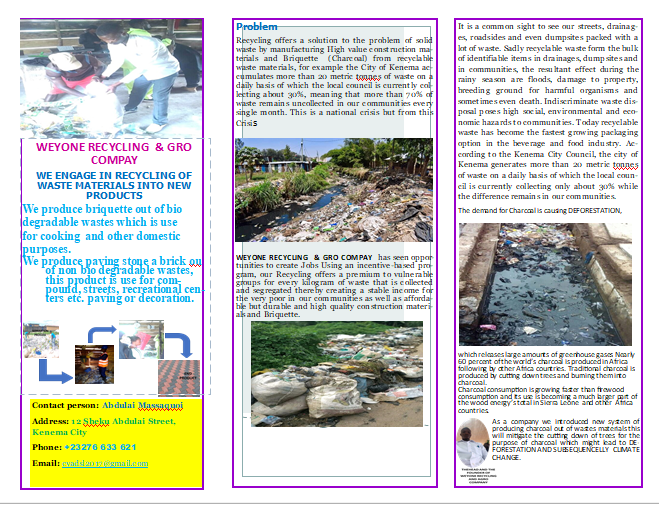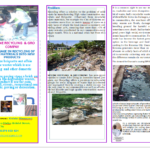Indiscriminate waste disposal poses high social, environmental and economic hazards to communities. Today recyclable waste has become the fastest-growing packaging option in the beverage and food industry. According to the Kenema City Council, the city of Lusaka generates more than 1200 metric tonnes of waste on a daily basis of which the local council is currently collecting only about 30% while the difference remains in our communities.
Weyone Recycling offers a solution to the problem of solid waste by manufacturing high-value construction materials and furniture from recyclable waste materials, for example, the City of Kenema accumulates more than 1200 metric tonnes of waste on a daily basis of which the local council is currently collecting about 30%, meaning that more than 15 million kilograms of waste remain uncollected in our communities every single month. This is a national crisis but from this Crisis, Weyone Recycling has seen opportunities to Create Jobs
Using an incentive-based program, Weyone Recycling offers a premium to vulnerable groups for every kilogram of waste that is collected and segregated thereby creating a stable income for the very poor in our communities as well as affordable but durable and high-quality construction materials and furniture.
It is a common sight to see our streets, drainages, roadsides and even dumpsites packed with a lot of waste. Sadly, recyclable waste forms the bulk of identifiable items in drainages, dumpsites and in communities, the resultant effect during the rainy season are floods, damage to property, breeding grounds for harmful organisms and sometimes even death.
Our innovation has a very benefit which is poor people will earn an income for segregating and collecting waste recyclable materials which we will off-take at an agreed fee. We also piloted this concept in the Garden compound of Kenema over a period of 72 days. We had over 100 vulnerable residents recruited for the project, 65% of them were women.
Our Goals include:
- It will address the indiscriminate disposal of solid waste in most high-density areas
- We will mitigate the cutting down of trees for purpose of charcoal as this led to deforestation and subsequently climate change by producing briquette/charcoal out of biodegradable waste.
- Provides smallholder farmers with innovative products that are environmentally friendly and enable farmers to save time
- Provide a cheaper, sustainable and environmentally friendly alternative to timber and other construction materials such as tiles, pavers, poles, interlocking bricks, furniture etc this addresses problems of deforestation and reduces the effects of climate change
- Will create employment and a source of living for the marginalised youth groups in our communities
- Able to use this technology to put up affordable and durable livestock sheds and housing etc
To learn more about this initiative please contact us: cyadsl2017@gmail.com

